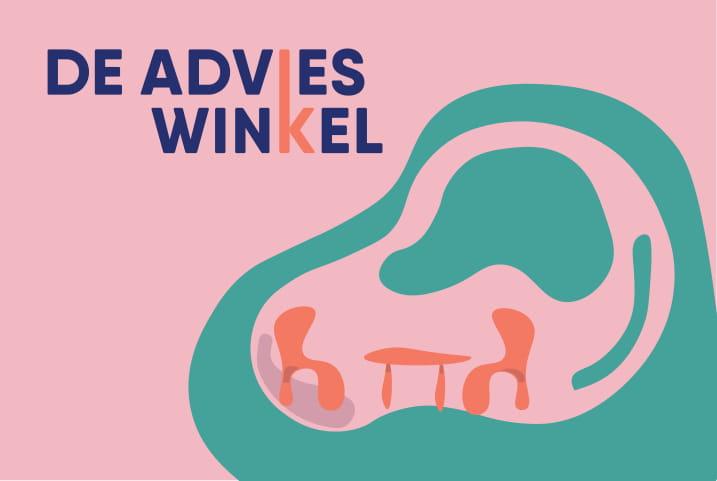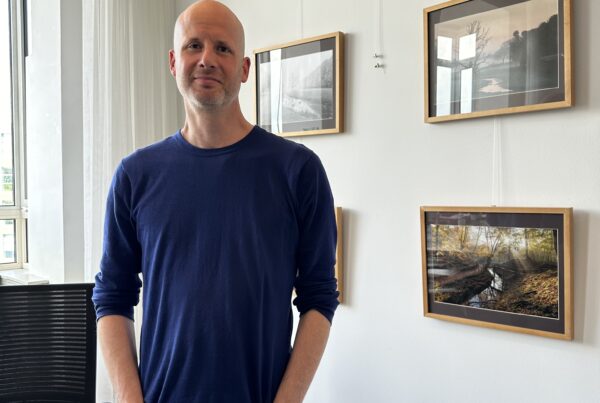
For this month’s office hours, Spiegeloog talked to De Advieswinkel, a non-profit organisation that offers free and open-ended conversations for everyone wishing to talk or discuss their problems. The organisation, located in CREA at the Roeterseilandcampus, is fully run by senior psychology students who help on a voluntary basis.

What exactly does De Advieswinkel do?
‘De Advieswinkel offers up to five free, anonymous and open-ended conversations to everyone that wishes to talk about their problems. Everyone is welcome, but in practice we mainly talk to students who want to discuss their everyday problems or need to unload their stories. De Advieswinkel offers people a safe space to talk, which is more approachable than a psychologist’s office. Having someone listen to your problems can be a great comfort to people.
In addition to helping these students in need, De Advieswinkel also offers work experience to the senior psychology students who volunteer here. At the moment it can be hard for psychology students to find a place to obtain clinical work experience. De Advieswinkel offers their volunteers training, lectures and advice by psychologists qualified by the GGZ; the sector organisation of specialist mental health and addiction care providers in the Netherlands (GGZ Nederland, n.d.). In addition to the experience volunteers get from the training, they also gain work experience from the actual conversations with clients. So, students on both sides of the conversation benefit from De Advieswinkel.’
Why do you focus on helping students?
‘Well, first of all our office is located in CREA, right at the Roeterseilandcampus. So we are literally amidst many students all the time. Apart from our location it’s also good to have one group to target. It helps us build our name and is easier for advertising. Finally, we are students ourselves as well. This means that we can probably relate to our clients better, since we are going through the same phases in life. This is however not always the case, since every life is, of course, different.
I think students are a group that need mental support, because they have to deal with the expectations of the ‘student-life’. Many students might feel the pressure that their time as a student has to be the best time of their lives in which they make many friends and do a lot of fun things. In reality, this is not always the case. The discrepancy between these high expectations and reality could lead to psychological problems. I think it can be beneficial for students to talk freely about this with other students.’
Are your volunteers trained enough to have ‘difficult’ conversations?
‘All of our volunteers are psychology students who have advanced quite far in their studies. So they already have a lot of knowledge about listening and conversing using psychological theory. Furthermore, they are not allowed to have conversations with ‘clients’ right away. We first select student volunteers we think are suited to help us in an application process. After we accept them, they have to be trained by GGZ-psychologists, before they can start having conversations with clients. To further ensure that things are done right, every client always speaks with two of our volunteers in a conversation. One of them does the talking and the other listens and is there in case the first volunteer doesn’t know how to continue or needs help. This ensures a smooth course for the conversations.
We try to have as few conversations with clients as possible. When people keep coming back too many times, the process starts to look too much like treatment. We are not certified to administer actual psychological treatment. Thus, if we feel that we are starting to cross this boundary, or if clients seem to have serious psychological problems, we advise them to speak to an actual clinical psychologist. We can then provide clients with information on how to contact a clinical psychologist or how to join a conversation group, for example. We limit ourselves to listening to our clients and helping them to set achievable goals. That is what our volunteers are trained for.’
De Advieswinkel is continuing to help people through online conversations during social distancing measures. For more information or to make an appointment, you can visit their website.
References
– GGZ Nederland, Dutch association of mental health and addiction care. Retrieved on 22th of April 2020 from https://www.ggznederland.nl/pagina/english

What exactly does De Advieswinkel do?
‘De Advieswinkel offers up to five free, anonymous and open-ended conversations to everyone that wishes to talk about their problems. Everyone is welcome, but in practice we mainly talk to students who want to discuss their everyday problems or need to unload their stories. De Advieswinkel offers people a safe space to talk, which is more approachable than a psychologist’s office. Having someone listen to your problems can be a great comfort to people.
In addition to helping these students in need, De Advieswinkel also offers work experience to the senior psychology students who volunteer here. At the moment it can be hard for psychology students to find a place to obtain clinical work experience. De Advieswinkel offers their volunteers training, lectures and advice by psychologists qualified by the GGZ; the sector organisation of specialist mental health and addiction care providers in the Netherlands (GGZ Nederland, n.d.). In addition to the experience volunteers get from the training, they also gain work experience from the actual conversations with clients. So, students on both sides of the conversation benefit from De Advieswinkel.’
Why do you focus on helping students?
‘Well, first of all our office is located in CREA, right at the Roeterseilandcampus. So we are literally amidst many students all the time. Apart from our location it’s also good to have one group to target. It helps us build our name and is easier for advertising. Finally, we are students ourselves as well. This means that we can probably relate to our clients better, since we are going through the same phases in life. This is however not always the case, since every life is, of course, different.
I think students are a group that need mental support, because they have to deal with the expectations of the ‘student-life’. Many students might feel the pressure that their time as a student has to be the best time of their lives in which they make many friends and do a lot of fun things. In reality, this is not always the case. The discrepancy between these high expectations and reality could lead to psychological problems. I think it can be beneficial for students to talk freely about this with other students.’
Are your volunteers trained enough to have ‘difficult’ conversations?
‘All of our volunteers are psychology students who have advanced quite far in their studies. So they already have a lot of knowledge about listening and conversing using psychological theory. Furthermore, they are not allowed to have conversations with ‘clients’ right away. We first select student volunteers we think are suited to help us in an application process. After we accept them, they have to be trained by GGZ-psychologists, before they can start having conversations with clients. To further ensure that things are done right, every client always speaks with two of our volunteers in a conversation. One of them does the talking and the other listens and is there in case the first volunteer doesn’t know how to continue or needs help. This ensures a smooth course for the conversations.
We try to have as few conversations with clients as possible. When people keep coming back too many times, the process starts to look too much like treatment. We are not certified to administer actual psychological treatment. Thus, if we feel that we are starting to cross this boundary, or if clients seem to have serious psychological problems, we advise them to speak to an actual clinical psychologist. We can then provide clients with information on how to contact a clinical psychologist or how to join a conversation group, for example. We limit ourselves to listening to our clients and helping them to set achievable goals. That is what our volunteers are trained for.’
De Advieswinkel is continuing to help people through online conversations during social distancing measures. For more information or to make an appointment, you can visit their website.



